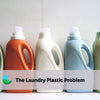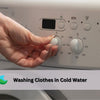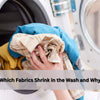Clean windows without streaks
- by Brodie Cook

Doing repetitive household chores, such as cleaning windows, is challenging, especially in the coastal weather with its harsh sun. It feels impossible to achieve a streak-free window.
Even when you have wiped and dried the windows, you often see those annoying streaks left behind on your windows. You’ve spent your energy on manual and repetitive work, but it doesn’t pay off.
Not to mention, if you live near the coast or bush, your window is rarely free from dust, bug splats, or even spider webs.
The window cleaners can be your best friend. But, what if you’re using a conventional one filled with harmful chemicals too often?
What are the impacts on your health? Even the impacts on this planet?
Have you ever considered using natural ingredients in your window cleaners? It sounds complicated to create a DIY for window cleaners, but we have the solution for you. Read this article to the end.
Why Conventional Window Cleaners Can Harm Your Health
Window cleaning is one of the most important things to do to make your home look brighter.
When it comes to window cleaning, it is easy to use conventional window cleaners that you can buy in your nearby convenience store.
The problem with conventional window cleaners is the hidden danger of the chemical ingredients.
The common chemical ingredients inside conventional window cleaners are Ammonia, Isopropyl alcohol, Sodium Lauryl Sulfate (SLS), Surfactants, Dyes, Volatile Organic Compounds (VOC), and many more.
If you use that conventional one regularly, your health is at risk. Here are the hidden dangers of conventional window cleaning solutions for your health.
1. Triggers Asthma & Respiratory Irritation
Most of the chemical ingredients, including Volatile Organic Compounds (VOC) such as ammonia, glycol ethers, bleach, and fragrances.
Those ingredients can trigger coughing, wheezing, and asthma symptoms. Besides, for the environment, it irritates the airways.
What are the worst things that could happen? It could exacerbate existing respiratory conditions.
There is a major study by the Environmental Working Group with over 3500 people across 10 countries.
The study found that just using spray cleaners once a week could raise your risk of getting asthma by 30 to 50%.
In fact, they linked around 1 in 7 adult asthma cases to exposure from these sprays, especially ones with VOCs like glass cleaners.
2. Skin Irritation
If you have sensitive skin, it could be prone to irritate your skin. The ingredients, like ammonia, are corrosive.
The ammonia ingredients could cause redness, dermatitis, burning, or chemical burns upon skin contact.
Even with the low percentage (<1% ammonia, <2% isopropyl alcohol), it can cause eye and skin discomfort.
3. Environmental Impact
When you rinse off cleaners with VOCs, surfactants, and ammonium compounds, they don’t just disappear.
They can end up in our waterways, leading to things like oxygen loss, algae overgrowth, and harm to fish and other aquatic life.
4. Harmful to Children and Pets
A lot of window cleaners are loaded with stuff like ammonia, bleach, chlorine, and even formaldehyde ingredients that are actually toxic to pets.
If they’re exposed, it can lead to things like vomiting, breathing problems, skin burns, or even seizures.
This Natural Glass Cleaner Does It All
You're a busy person and have no time for regularly cleaning the window using a DIY natural solution. So, you might consider the Lucent Globe Glass Cleaner Sheet.
A Lucent Globe Glass Cleaner Sheet is able to create 500 ml of cleaning solution, best paired with their glass reusable spray bottle. This clean sheet is free of harmful chemicals. The ingredients of this product include:
- Sodium Citrate and L-Glutamic Acid
- 1,3-Propanediol
- Polyglyceryl-4-Caprate
- Peppermint Essential Oil
The ingredients are highly designed for a streak-free formula. No nasties. No ammonia. It is biodegradable. Comes in Plastic-free packaging. And the cucumber and mint scent leaves your home smelling fresh.
The usage of this glass cleaner sheet is so simple. What you need to do is prepare a spray bottle.
Fill the spray bottle with water and add one glass cleaning sheet to the spray bottle. Shake it gently. And you can spray it onto your window.
Our Glass Cleaner sheets are natural and have a streak-free formula for your windows.
Interested in the other natural solutions, or the step-by-step for cleaning streak-free? Continue to read.
Natural Cleaning Solutions to Clean Your Windows
Can you achieve cleaning a window without streaks and with fewer harmful chemical ingredients? Absolutely, yes.
You can use natural ingredients available around you. These natural ingredients are proven to make your window crystal clear.
These ingredients wouldn't harm your health and also the environment.
1. White Vinegar
White vinegar is a highly recommended and effective ingredient for cleaning windows streak-free finish.
White vinegar, containing 5% acetic acid, which dissolves mineral deposits, cut through grease, fingerprints, and soap scum.
Unlike some commercial cleaners or soaps, vinegar dries without leaving behind oily films or soap residues, which are the main cause of streaks.
This makes it ideal for glass, mirrors, and other shiny surfaces.
2. Lemon Juice
This is an ingredient you can find in your kitchen. Lemon juice is another powerful ingredient to clean the window with stubborn streaks or dust.
Lemon juice contains high levels of citric acid. Citric acid breaks down grease, fingerprints, and smudges.
When used with a microfibre cloth or squeegee, the lemon juice evaporates cleanly, without leaving sticky or oily residue.
Want to know the best thing? When it is combined with white vinegar, it could enhance streak-free performance on your window.
3. Baking Soda
Baking soda is something you might already have in your pantry. The baking soda is a mild abrasive that can remove stubborn dirt and grime.
Baking soda has a fine, gritty texture, that helps scrubb off stuck-on grime such as bug splatter, hard water spots, soap scums.
The gritty texture of baking soda can remove buildup without scratching glass surfaces when used gently.
Baking soda is a mild alkali, which makes it effective for breaking down oily or greasy film on windows.
But the result of the baking soda usage depends on the methods of application to achieve a streak-free finish.
4. Essential Oil
There are so many variants of essential oils. But, if you ask, which variants work to achieve a streak-free finish?
The answers are tea tree, lemon, eucalyptus, lavender, and peppermint. Those essential oil variants have proven antibacterial, antifungal, and antiviral properties.
These essential oils help disinfect the window surface without harsh chemicals.
Your Tools to Make Your Window Crystal Clear
You've understood what kind of natural ingredients you can use to achieve clean windows without streaks.
Now, it's time to prepare your ready tools to make your window crystal clear.
What things will you need are,
- Microfibre cloths
- Squeegee
- Spray bottle (refillable)
- Bucket for spot-scrubbing or outdoor use
- Soft Sponge or Scrubber Pad (Non-abrasive)
- Water
Your Step-by-Step Guide to Clean Window Streak-Free
You have your equipment in your hand. It's time to take action to achieve a streak-free view.
Imagine all the windows in your house are free. It makes your house look like a new house.
So, let's get started!
1. Clean Windows on a Cloudy Day
Avoid choosing a time when the sun shines brightly. When we choose to clean the window at that time, it will be easier to leave streaks on the window.
How does that happen? Because when the sun shines brightly, the window cleaner dries too fast before you can wipe it. At the end, it will leave the strike.
The right time to clean the windows is on a cloudy day.
If you can't wait for the cloudy day, you can choose the beginning of morning, late afternoon, or an overcast day.
2. Dust The Window Frames and Sill First

Before you clean the glass of the window, clean the dust and grime on the window tracks and frame first.
You can use a dry cloth or brush to remove dust, cobwebs, or bugs around the frame and sill. Then, to make it easier, you can use a vacuum to pick up any kind of dirt left on the sill or the floor.
Why should this step come first? Because the dust or grime can turn into mud when it gets wet.
3. Mixing The Natural Solution
It would be better to avoid using window cleaners that contain ammonia, detergent, SLS, and other harmful chemicals.
You've learned the natural solution. Here are some recipes for mixing the natural solution.
a. White Vinegar Glass Cleaner
Prepare these ingredients:
-
1 cup white vinegar
-
1 cup water
-
(Optional) 5–10 drops essential oil (lemon, lavender, eucalyptus)
Combine all ingredients in a clean spray bottle.
b. Lemon Juice Glass Cleaner
The ingredients you need are:
-
3 tablespoons fresh lemon juice (or bottled, no sugar)
-
1 cup distilled water
-
(Optional) 1 tablespoon white vinegar for added cleaning power
Mix in a spray bottle.
c. Baking Soda Paste
The ingredients for baking soda are quite simple,
-
2 tablespoons baking soda
-
Small amount of water (just enough to form a paste)
Mix baking soda and water into a paste. Avoid using tap water to mix baking soda, because minerals in the water can leave white spots or streaks on the glass.
d. Essential Oil Glass Cleaner
This natural solution is suit for people with sensitive to smells or chemicals. Here are the ingredients, and don't forget to add all ingredients into a spray bottle.
-
1 cup distilled water
-
1 cup white vinegar (or lemon juice)
-
5–10 drops essential oil (lemon, tea tree, lavender, and peppermint.
4. Spray The Natural Solution onto Windows
Your natural solutions are ready. You can choose which easiest way for you to create the DIY natural solutions.
Add all the natural ingredients that you've chosen into the glass spray. Shake it gently.
Then, spray the natural solution onto windows, You can start from top to bottom.
Spray it lightly but evenly over the glass.
5. Wipe or Scrub The Window Gently

The natural solution is on the glass. Then wipe or scrub it gently.
For stain areas, use a soft sponge or microfibre cloth in circles.
For sticky bits, like birds poo, bugs, or spider web, let the solution sit for 1-2 minutes before wiping it.
You can use a squeegee to wipe the solution on the glass.
Pro tips: Start from the top corner and drag the squeegee down in a straight line.
Wipe the blade with a cloth between each swipe.
This step is what gets rid of streaks.
6. Drying The Edges
This step is crucial for achieving a truly streak-free finish.
After cleaning the glass, always switch to a separate, clean, and dry microfiber cloth specifically for this task.
Avoid reusing the same cloth used for wiping the glass, as it may still be damp or hold cleaning solution that can cause streaks.
Once the edges are dry, you can go one step further by lightly buffing the entire window in a circular motion with a dry section of the microfiber cloth.
This removes any leftover haze and gives the glass a polished, crystal-clear look.
Avoid using paper towels or regular rags, as they tend to leave lint behind.
Also, skip terry cloths, which may be too rough and risk causing micro-scratches.
Maintenance Tips for Long-Lasting Results
How often do you need to clean your windows and get a long-lasting result?
If you want to get the best and longest-lasting results, you need to clean the windows regularly. It might be twice or three times a month.
The other tips to clean the windows that keep shining and streak-free are,
- Wipe down windows regularly with a damp microfibre cloth.
- Clean windows every few months, or more frequently if needed.
- Consider using a natural window protectant

 Dishwashing
Dishwashing Laundry
Laundry Bundles
Bundles Surfaces
Surfaces Toilet
Toilet Handsoap
Handsoap Multi-Purpose
Multi-Purpose Floor
Floor




